Suchergebnisse für "Factsheet: Energietechnologien gestalten, die für alle sinnvoll und nutzbar sind"
Living and Working in the Moosburg, the "community of education"
The design aims not only at creating comfortable living spaces and practical work environments, but at connecting these realms, thus providing a holistically attractive “living space”. A pilot project will be built on an appropriate site in the very core of Moosburg, neighbouring both the village square and the educational campus.
Innovative system for decentralized CHP on basis of biomass gasification with process optimized production of a low-tar producer gas
Tar loads in the producer gas of CHP-plants based on biomass gasification are reduced by primary measures (staged gasification), whereby the possibilities for application are increased.
BIO4GAS: A small capacity 4-chamber-biogas system for the efficient production of biogas from agricultural wastes
Implementation of an innovative and economic small capacity 4-chamber-biogas system in standardised design at the agricultural school Rotholz, Tyrol, and scientific studies to optimise biogas yield. Characterisation of process relevant micro-organisms is also planned.
HEROES - Houses for Energy- and ResOurce Efficient Settlements
A simplified method will be developed for the calculation of environmental indicators for so far not considered building elements (eg. constructions, which are not thermally relevant and HVAC-components). The theoretical principles for the calculation of the primary energy demand and the CO2-Emissions for operating and raising a building will be harmonized.
Criteria catalogue for quality assurance in the construction of passive houses built in wood
By means of a criteria catalogue possible sources of error in the construction of passive houses built in wood will be identified both craft specific and concerning the installation of house automation facilities. Solutions will be acquired, a controlling tool for construction sites will be offered.
Smart Grids Week 2010
22. - 25. June 2010
Salzburg AG/Congress Salzburg
5020 Salzburg, AT
Austrian Smart Grid Pioneers in Dialogue. Guest Countries: Germany and Switzerland
StraTex ‐ Sorting and processing strategies for used textiles to produce recyclable fractions
In StraTex, suitable, economically viable and holistic strategies for the collection, processing and automated sorting of mixed non‐reusable textiles are being developed and experimentally implemented in order to increase the proportion of marketable fractions for high‐quality material recycling (preferably fibre2fibre).
ESSBAR – Edible balcony gardens for retrofit – Vertical Greening Technologies for the City
Demonstration of an affordable, resource-saving and innovative balcony system with integrated edible vertical gardens and rainwater management. Considering the needs of residents for green outdoor spaces and the active participation of residents are an important part of the project.
Sustainable Lighting
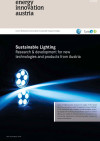
Research & development for new technologies and products from Austria Today
energy innovation austria
4/2014
Herausgeber: BMVIT and Klima- und Energiefonds
Englisch, 8 Seiten
Downloads zur Publikation
Marktreifes Plus-Energie-Büro
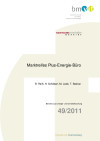
Schriftenreihe
49/2011
B. Reiß, H. Schöberl, M. Leeb, T. Bednar Berichte aus Energie- und Umweltforschung 49/
Herausgeber: BMVIT
Deutsch, 164 Seiten
Downloads zur Publikation
Photovoltaics - a key technology
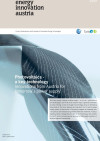
Innovations from Austria for tomorrow`s power supply
energy innovation austria
2/2017
Herausgeber: BMVIT und Klima- und Energiefonds
Englisch, 8 Seiten
Downloads zur Publikation
GREeNvaluation - Real-time monitoring and performance evaluation
The aim of the project was the development of the GREeNvaluation toolkit, as a precursor to the implementation of green and liveable cities. The visualization and accounting (cost / benefit) of green infrastructure services makes the benefits more tangible and understandable. The GREeNvaluation toolkit aims to create awareness far beyond the target areas by means of target group-specific communication formats.
Cities as innovation drivers
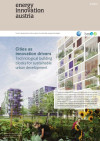
Technological building blocks for sustainable urban development
energy innovation austria
4/2013
Herausgeber: BMVIT, Klima- und Energiefonds
Englisch, 8 Seiten
Downloads zur Publikation
Innovations for the city of tomorrow
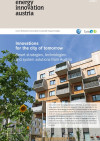
Smart strategies, technologies and system solutions from Austria
energy innovation austria
4/2016
Herausgeber: BMVIT und Klima- und Energiefonds
Englisch, 16 Seiten
Downloads zur Publikation
Building innovations from Austria in the Arab world
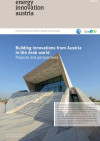
Projects and perspectives
energy innovation austria
3/2014
Herausgeber: BMVIT and Klima- und Energiefonds
Englisch, 8 Seiten
Downloads zur Publikation
Tomorrow's heating networks
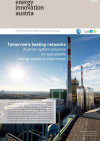
Austrian system solutions for sustainable energy supply in urban areas
energy innovation austria
1/2015
Herausgeber: BMVIT & Klima- und Energiefonds
Englisch, 8 Seiten
Downloads zur Publikation
AIA4ALL - development of open, modular and automatable employer’s information requirements (EIR) and BIM execution plan (BEP)
The Employer's Information Requirements - EIR (German: AIA) - serves the client to define goals and use cases for a BIM-based construction project. The aim of this project is to create a modular, machine-readable AIA that can be seamlessly integrated into the tool landscape of openBIM projects. This is done by developing an open platform for creating use cases for the AIA.
IEA Bioenergy Task 33: Gasification of Biomass and Waste (Working Period 2019 - 2021)
The main aim of IEA Bioenergy Task 33 is the international as well as national information exchange and networking on thermochemical gasification of biomass and waste. The focus is on exchange of information regarding R&D programmes in area of biomass and waste materials gasification, commercial facilities and the marketing chance for gasification facilities to identify and avoid technical and non-technical hurdles.
GreenPlusSchool@urban - Highly efficient facade and roof greening in combination with PV; optimal solution for energy efficiency in overall environmental consideration
In this project, different building-greening systems and plant/substrate types, combined with various PV modules, had been examined on a Viennese school. The influence on the hygrothermal behaviour of the building, energy-saving potential, humidity, shading, noise reduction, water retention and heat island effect are being scientifically explained. The students of the school will also be involved.
Bioenergy Technology of Tomorrow
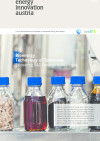
Pioneering R&D Findings from Austria
energy innovation austria
1/2012
Herausgeber: BMVIT & Klima- und Energiefonds
Englisch, 8 Seiten
